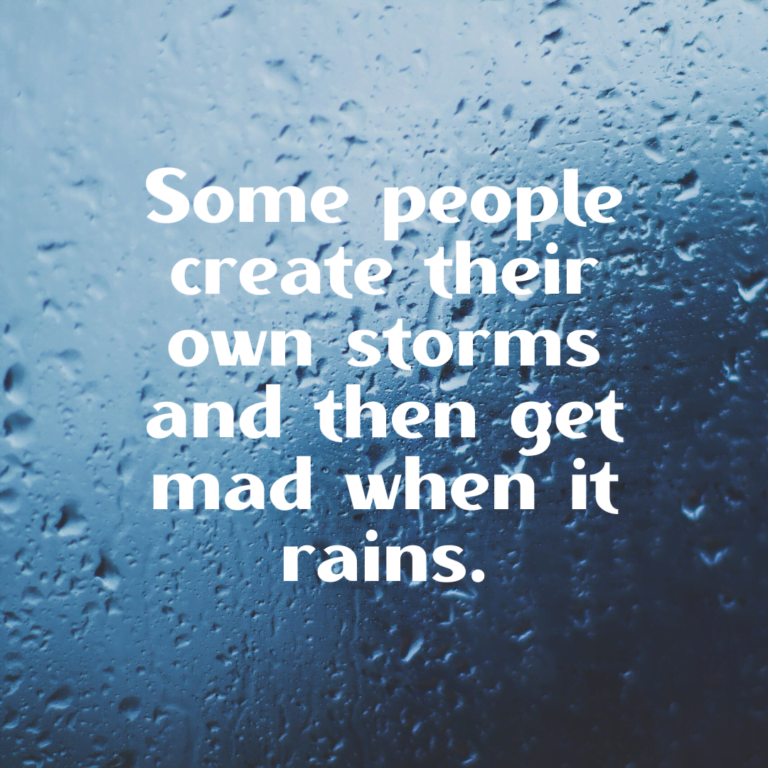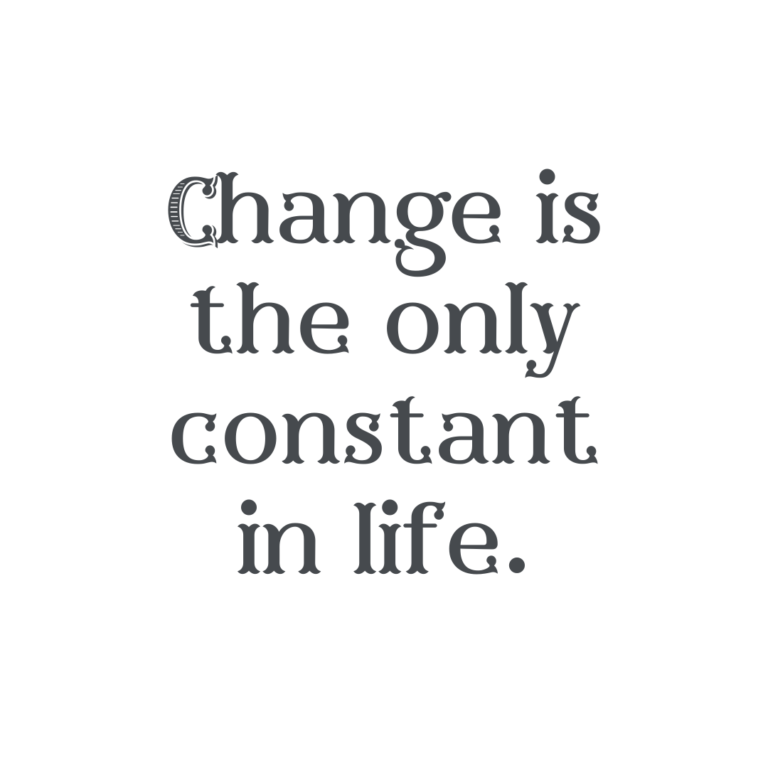Some people create their own storms and then they get mad when it rains.
Some people thrive in crazy-making and chaos because it is what feels normal to them. It’s completely maladaptive and no doubt draining to that person as well as those around them. What kind of behavior will you see if you’re standing in the middle of someone else’s crazy-making storm?
- Gaslighting tactics. This is the most common trait. This can look like making you feel like something did (or didn’t) happen when it really didn’t (or did). You can leave a conversation with them doubting your own perception of what really happened or feeling crazy yourself.
- They have a selective memory. If you remind them that you have told them how a certain behavior hurts you, they have no recollection of that conversation.
- The rules will change on a whim to conform to how the crazy maker is feeling in that moment.
- You feel like you are damned if you do, and damned if you don’t when offering solutions to the problem.
- They will tend to project their own feelings onto you to avoid responsibility for their own feelings.
- Communication is not fair and assertive. You are met with passive aggressiveness.
- This person will lack any kind of true empathy for you.
- Everything is very black and white or a crisis and the end of the world.
- They try to make you feel guilty for things that you shouldn’t feel guilty about.
- They will offer you inconsistent praise. Some people are very vulnerable to becoming addicted to inconsistent praise. The crazy maker will give you praise, and you will feel good about things, and then they quickly take it away. There have been numerous studies that show how addictive inconsistent praise can be to people and how praise from someone who doesn’t give it often, is more meaningful. It’s actually been equated to the inconsistent reward of gambling addiction.
Often times if you are dealing with someone who is engaging in crazy-making behaviors, it can be hard to see, especially if they are a loved one or if they are close to you. A crazy maker craves your energy in the conversation, almost like an emotional vampire does. It’s easy to get into an argument with them, but what you have to understand is that any kind of “rules of engagement” in an argument will quickly change to what the crazy maker wants and needs. What “rules” might apply today, may not apply tomorrow. You will only leave the conversation feeling more confused and drained.
Here are some steps you can take to maintain your own sanity in these situations:
1.) Detach yourself from the situation. When you can take a step back and understand that what is happening is someone else acting out their own issues, it’s easier to not get drawn into it or offended by what they’re saying.
2.) Reduce the amount of time you spend with them. If you have to spend time with them, make sure you balance it with time away from them where you are practicing self-care and nourishing your soul.
3.) Maintain healthy boundaries. If you aren’t dependent on external validation, then you will have stronger boundaries with others. Know that you have a right to set whatever boundaries you feel comfortable with and that “no” is a complete sentence.
Finally, if you have a partner or someone close to you in your life who is a crazy maker, also take a look at how you feel about yourself. Often times we can attract crazy makers into our life because we struggle with our own self-worth. We can get into a vicious cycle of tying our self-worth to how the crazy maker treats us. And we keep playing the game until they finally treat us better, but they never actually do. Pay attention to how the crazy maker treats other people. Does he or she treat others better? Are the people they are treating better exude a higher sense of self-worth?
If you are struggling with this, know that you are worth so much more and start giving yourself the love and respect you deserve. We teach people how to treat us and what we allow will continue.
Video for Some people create their own storms and then they get mad when it rains…
In order to rise from its own ashes, a phoenix must first burn.
In mythology, the phoenix is a large and radiant bird with beautiful plumage and magical capabilities. With brilliant hues of reds, yellows and purples, it associated with sun and fire. The phoenix builds his own funeral nest, and when it is time, he lights himself on fire with a single clap of his wings. He turns to ashes, then rises again, reborn.
The phoenix symbolizes rebirth and renewal. The end is never the end for this amazing bird. What looks like death and destruction to someone who doesn’t know the phoenix, is actually renewal, rebirth and new beginnings.
Sometimes our lives have to completely fall apart, so we can rebuild it, stronger than it’s ever been. We have to go through the darkness to get to the light. What may feel like the end of the world, may be a necessary step in our journey for our next chapter.
You are a phoenix. And you will be reborn again, beautiful and majestic. So, when you feel like giving up, remember these things:
1.) Motivation does not come from a feeling; it comes from action. We tend to wait until we feel like we are in the right mood to feel inspired, but the reality is, action causes us to feel like we are doing something towards our goals. And that is why we begin to feel inspired. It’s not from thinking about it, it’s from doing something about it.
2.) Know your “why”. Why are you doing this? What are your reasons? When you understand the why, the how becomes a lot easier. The “how” can be trial and error. If something doesn’t work, that’s okay, keep going and try something else. If it doesn’t work, you’ve just learned something and it’s just a data point.
3.) Don’t compare yourself to others or their journeys. You are on your own unique path that is for you and you alone. Comparing yourself to others, is like comparing apples to oranges. It’s an unfair comparison, because each are different. The only thing you should ever compare yourself to is the person you were yesterday.
4.) Be easy on yourself. We are going to experience heartbreak, loss and setbacks. These can be hard to deal with, so be gentle with yourself. It’s okay to fall in the water and cry, just don’t stay there. Experience the emotions, then let them go and practice self-care. You deserve to treat yourself well.
5.) Exercise. Whether it’s walking out in nature or lifting weights, nothing restores my soul and “resets” my mind like physically doing something. The endorphins produced by exercise reduces stress and anxiety, helps you sleep better, improves cognitive function and overall lifts your mood. Putting yourself in the best mental place you can be every day, helps you overcome feelings of discouragement or wanting to give up.
Your turn…how will you rise from your ashes?
Change is the only constant in life.
If you can count on anything in life, that is change. Just like the seasons change and we grow and evolve, everything else around us changes. We have this comfort in the known and when we feel the threat of change, we freak out.
But since change is going to happen anyway, why not embrace it? Instead of seeing it as an inconvenience, what if we looked at it like an opportunity?
Here are some ways you can become more open to change:
1.) Give up feeling resistant to it. Our natural reaction is to hunker down in our position and try to resist it or try to get out of the situation. We like feeling in control. Lao Tzu teaches us that resistance to change creates sorrow in the long run. Why? Because we can’t control everything that happens. What we can control is our response to it.
2.) See change as an opportunity for growth. When things are changing around us, it can test our character and all that we are. It forces us out of our comfort zones, which is where the magic happens. We can look at change as an ally, and as something that helps propel us forward to transform us.
3.) Affirm to yourself that you are adaptable. Change allows us to learn how to become more resourceful, flexible and resilient. It is the ultimate test for us. If we tell ourselves that we got this enough, we will begin to believe that we do. And as we overcome challenges that come with change, we will see evidence of it.
How are you responding to change in your life?
Berry Smoothie
Okay, so I am back with a self-care Sunday post! The last two weeks have been hectic!
One of the ways I love to get my day started is with a healthy smoothie. I feel like I am caring for my body on a nutritional level, and it just tastes amazing. And I find that by getting my day started with having something healthy for breakfast, it kind of gets me into the right frame of mind to make additional healthy choices through out the rest of the day.
Today I’m sharing my berry smoothie recipe, but by all means, feel free to substitute the things that you enjoy in place of my ingredients. Let me know what kind of variations you like in yours in the comments section!
Berry Smoothie Recipe

Ingredients:
- 1 whole banana
- 1 frozen acai puree (I buy Sambazon Acai Original Blend Superfruit Frozen smoothie packs in the frozen section) – partially thawed
- 1/2 to 3/4 cup of blueberries
- 4 ounces of yogurt – I like Vanilla Activia or Siggi’s Vanilla
- 8 ounces of orange juice OR brewed and chilled green tea. OR you can do 4 ounces of OJ and 4 ounces of the green tea
- 1 serving of Vanilla Whey Protein Powder (I like Whole Food’s brand)
- 1 serving of psyllium husk (I use Whole Food’s brand because it has less sugar added)
- 1/2 teaspoon-ish of matcha powder
Instructions:

Using a blender, blend all ingredients until they are in a smoothie like consistency.
For today’s smoothie, I did 8 ounces of orange juice because I hadn’t brewed and chilled green tea in advance. On Saturdays, I will prep all the powders I use (the protein powder, psyllium husk and matcha powder) and store them in small glass jars. I will also brew green tea, let it cool and store it in a mason jar in the fridge to have it on hand for when I want to make a smoothie.
The matcha powder does give the smoothie a slight green tint and earthy taste, as opposed to a sweeter berry taste. So if you don’t like it, just leave it out and the smoothie will taste sweeter.
But here is the finished product! Let me know if you try it and what you think! If you have any recommendations, I would love to hear about them, too!

The unfed mind devours itself.
When we don’t keep ourselves busy and feed our mind positive things, we can fall into the trap of getting in our own head. Whether it’s our own thoughts or all of scary headlines about coronavirus we are bombarded by daily.
What does that mean? It means we tend to overthink things, self-examine and worry beyond what healthy reflection is. We can get caught in the vicious cycle of rumination and stay stuck there.
Let’s look at common triggers for overthinking:
- Replaying a high stress situation over and over again and feeling unsure about how to handle it.
- Feeling uncertainty about the future.
- Having an upcoming deadline on a decision you have to make, or second guessing a decision you’ve already made.
Here are some ways you can pull yourself out of this cycle of overthinking things.
1.) Check the facts. It is so easy for us to get consumed by our feelings and worries in these moments. We often mistake fears or worries for the facts, when they are just how we are feeling. For example, if I find myself in my head replaying how my boss has been acting and I am afraid of losing my job, my fears and worry can make things appear worse than they are. Give yourself a reality check by asking yourself if things have really escalated to that point where you think you are going to lose your job. Have you had a meeting with HR? Have you been given warnings about certain behaviors? Then give yourself an honest assessment of your job performance, noting where you bring value to the company and develop an action plan for improvement that you can present, should things get to that point.
2.) Play a game of possibilities. If you find yourself ruminating over a conversation you had with someone because they got snappy and you feel like it is about you, get silly and creative thinking about alternative meanings as to why they acted that way. For starters, it can be funny. But more so, most of the time how people act towards you has nothing to do with you and everything to do with how they are feeling about something on their mind, or how they feel about themselves.
3.) Create a healthy distraction. Sometimes just blocking out what is in your own head and filling it with a healthy distraction can calm you down so you can look at things more rationally. By giving yourself time away from the stressors and doing something productive, often you can approach the subject afterwards from a much better place.
4.) Lean on a good support system. Sometimes just “checking” our thoughts with a friend can make all the difference. Maybe you are feeling insecure about something that happened and your friend can see it more objectively and offer a new perspective.
Expectation is the root of all heartache.
Coined by Shakespeare, this quote rings true in so many situations. For today, I am going to focus on expectations in relationships. Even the healthiest relationships can be undermined by expectations. And when I talk about expectations, I mean day to day expectations of others. Not standards like wanting to be treated with dignity and respect in a relationship. We’ll save that for another post.
As humans, we are conditioned to believe that our happiness is created by the fulfillment of our expectations. There isn’t anything wrong with this on a small scale, but when the expectations involve another person, you are setting yourself up for disappointment. Why? Because not every person is going to be interested in living up to your expectations, and that is actually…healthy. Let’s look at it on a small scale.
If I expect my husband to make me a cup of coffee in the morning and he is focused on what he has planned for work that day, so he didn’t make it for me, I walk away from that situation from a mindset of lack. I wonder why he didn’t make me coffee and it turns into an expectation that I attach feeling slighted to. Whereas, if I walk into the kitchen with no expectations whatsoever, and he brings me over a cup of coffee, and am surprised and delighted.
Overall, we have this idea that on some level we can control how others act. We have our expectations and our desired outcomes. What’s really crazy is that because we have them, we actually believe that the other person will understand it and do what we want. And when they don’t, we are shocked and become resentful. When you take a step back, it’s rather entitled, isn’t it? Why is it another person’s responsibility to do what I want them to do? It sure shouldn’t be.
The reality is, we are all individuals and have our own priorities. We don’t mean to hurt the other person or make them feel bad. So how can we let go of expectations we may feel towards our partner?
1.) When you feel yourself expecting a certain reaction from them, stop yourself. Reframe it and tell yourself that you are totally open to the reactions of your partner.
2.) Understand why you have the expectations that you have and what it means. We often search for reassurance or security by our partners responding a certain way. And when they don’t, we attach more meaning to it than it warrants. A more effective way to address it, is to have a separate conversation about how you’re feeling.
3.) Build your own confidence and become unshakeable. When you know that you are a good person and that you behave with integrity, you don’t rely so much on external validation. You already feel it within yourself and you don’t take what other people do or don’t do as personally.
What expectations do you have in your life today that is causing your heartache?









